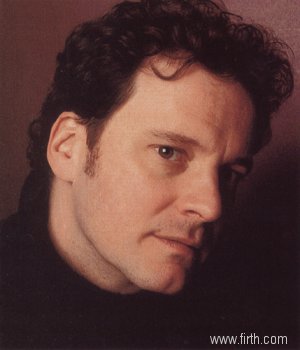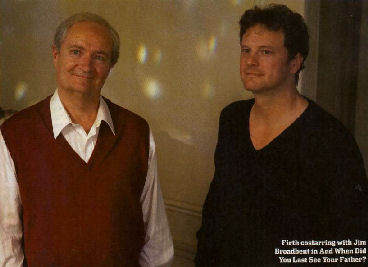Dashing his reputation
Still renowned as dishy
Mr Darcy, Colin Firth tells Leigh Singer how he debunks the tag of
‘quintessential Englishman’
|

|
When Star Trek’s Leonard Nimoy named his first autobiography, he boldly
went where no actor had gone before, declaring of his famous Vulcan
alter ego, I Am Not Spock. Colin Firth hasn’t yet gotten around to
penning his own memoirs, but you can bet on the fact that ‘Darcy’,
either the Pride and Prejudice or Bridget Jones incarnations, won’t be
in the title.
Which isn’t to say that Firth’s face visibly drops at the mention of
his most popular role—Jane Austen’s smouldering, sopping-shirted hero—a
character that, even 12 years on, still sets many women’s hearts
aflutter. In fact, it’s Firth who brings the D-word up, a pleasant
surprise, even if it may be a preemptive measure.
“The Darcy thing is like a nickname you get at school and you can’t
shake off,” he says matter-of-factly, “but it’s no worse than that. You
can’t look down on it because actually you can’t quantify how much it’s
helped and how much it’s hindered. A certain amount of recognition is
necessary to keep you going...It might [have] saved me from oblivion
for all I know.”
Unlikely, given that Firth was already in the midst of a successful,
acclaimed acting career that started straight out of drama school with
his breakthrough film [sic]
Another Country. And behind roles that most people know—The English
Patient, Girl With a Pearl Earring, Love, Actually—there’s a parallel
career of afar more eclectic choices, such as a psychologically
disturbed loner in the British thriller Trauma or a seedy, Dean
Martin-style crooner in Canadian murder-mystery Where The Truth Lies
that seem to owe little to costume dramas.
Yet his sanguine assessment of public perception is delivered with a
pleasant candour and sense of humour that belies the public perception
of a brusque, brooding Darcy figure, or that other stereotype often
attributed to him, the “quintessential Englishman”.
“I’m just like every other English person of my generation,” he says
with a hint of incredulity about the incredulity journalists have had
about his ‘70s teenage years; all long hair, rock-fuelled rebellion and
flunked A-levels [sic]. “I
mean, I wasn’t born on a horse in f**king Derbyshire, you know.
“An awful lot of representations of particular myths are peddled by
people who are not actually of that [group]. I pointed this out to the
Greek press a couple of weeks ago on the set of Mamma Mia! when they
were talking about my playing the typical Englishman. An Englishman is
probably far better represented by Wayne Rooney or Johnny Rotten or
John Lennon.”
 That said, in his new film Firth plays a
variation on the intense, internalised British male that he does so
well. And When Did You Last See Your Father? details the complex
father-son relationship between the somewhat emotionally stifled
Morrison and his flamboyant, overpowering and now dying father, Arthur
(Jim Broadbent). That said, in his new film Firth plays a
variation on the intense, internalised British male that he does so
well. And When Did You Last See Your Father? details the complex
father-son relationship between the somewhat emotionally stifled
Morrison and his flamboyant, overpowering and now dying father, Arthur
(Jim Broadbent).
Given the intimate, emotionally revealing material—rivalry, remorse,
reconciliation—isn’t there an inevitable glance across to your own
family issues?
“All the stuff that the movie deals with, it’s not stuff that occurred
to me for the first time,” Firth states, “but it does make you reflect.
My parents are actually young and healthy, so it’s not like time is
imminently running out but the fact is, this is the time we’ve got and
don’t wait for the last minute.”
Firth comes from a
family of academics, spent some infant years in Nigeria but soon
settled—or rather didn’t—in various locations across England. He
acknowledges a typical teenage angsty relationship with his parents
that he’s long left behind, but equally admits, “there’s something that
makes you 16 again the minute you walk through your mum and dad’s
door.” Not that his father is anything like the larger-than-life
Arthur, but what was his reaction to the film?
“He’s seen it twice,” he relates. “He’s very into the questions that it
asks, partly because he’s just lost his father and probably feels more
like a son when he watches. He’s not a demonstrative, loquacious
person, he keeps very much to himself in a way but was very moved by
the film.” He pauses. “I haven’t really sat down with him—this is one
of the things you don’t do, sit down and have that conversation. Blake
sits at Arthur’s bedside and they’re going through bills!”
As a father to three sons of his own—two young boys with his Italian
wife Livia Giuggioli and 16-year-old Will from a previous relationship
with American actress Meg Tilly—Firth’s also well-placed to see both
sides of the parental dynamic. “I think I’m probably the kind of father
more like Arthur than Blake,” he considers. “I’m no shrinking violet
myself and I dare say that [Will’s] toes curl when I’m thinking I’m
being charming.”
Though perhaps Firth’s well-adjusted view of his career and screen
persona comes from the luxury of knowing that he’s getting an ever
wider range of roles nowadays, with the likes of St Trinians and of
course the movie adaptation of stage snash-hit, Mamma Mia!, opposite,
of all people, Meryl Streep.
“The minute I start telling people who’s in that, they say, ‘I’ve got
to see that’ with almost vindictive relish,” he smiles. “Not because
they think it’ll be a masterpiece, but rather, ‘I’ve got to see you in
Spandex.’ I’ve still got to go back next week and dance and sing to
Waterloo with Pierce Brosnan.”
Doubtless, starchy Mr Darcy wouldn’t approve. And no doubt Colin Firth
couldn’t care less.
|

